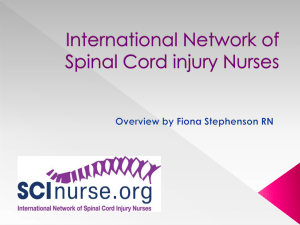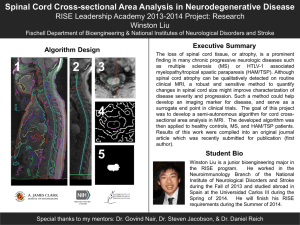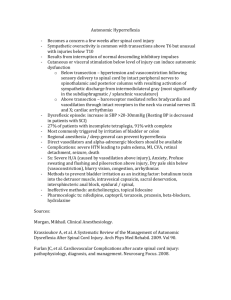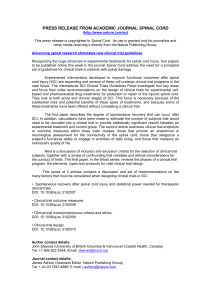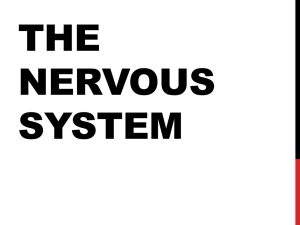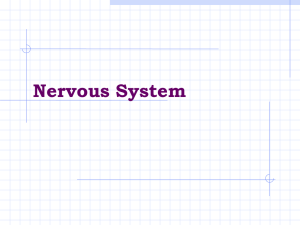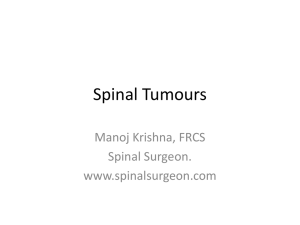Asterias Biotherapeutics Announces First Patient Treated in Phase 1
advertisement
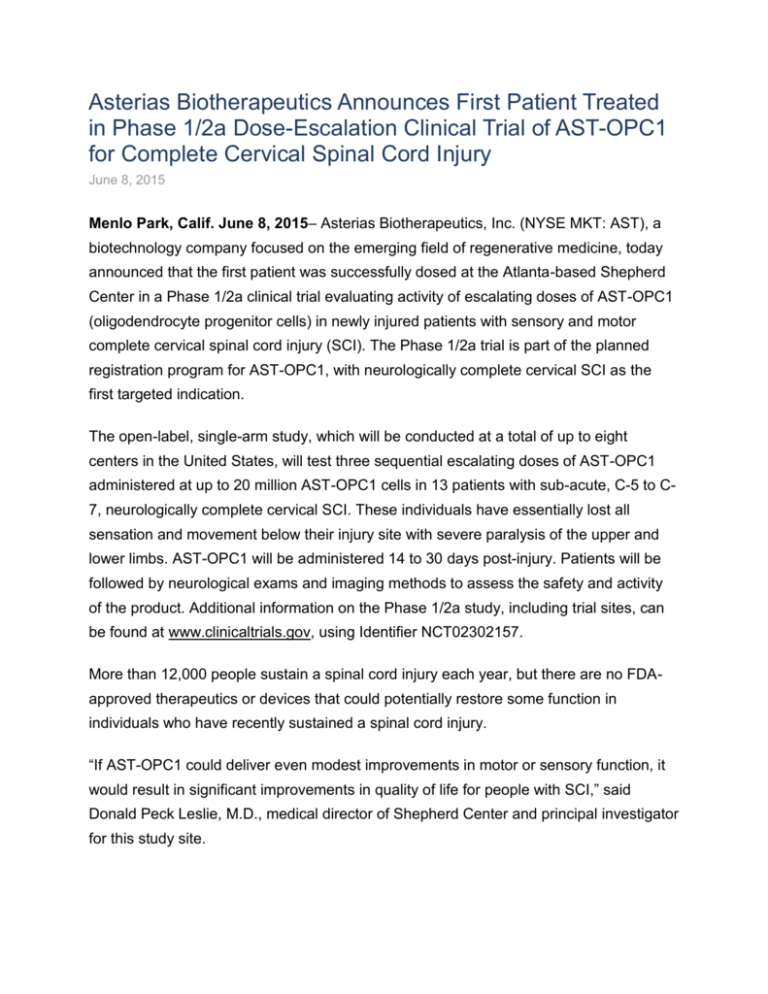
Asterias Biotherapeutics Announces First Patient Treated in Phase 1/2a Dose-Escalation Clinical Trial of AST-OPC1 for Complete Cervical Spinal Cord Injury June 8, 2015 Menlo Park, Calif. June 8, 2015– Asterias Biotherapeutics, Inc. (NYSE MKT: AST), a biotechnology company focused on the emerging field of regenerative medicine, today announced that the first patient was successfully dosed at the Atlanta-based Shepherd Center in a Phase 1/2a clinical trial evaluating activity of escalating doses of AST-OPC1 (oligodendrocyte progenitor cells) in newly injured patients with sensory and motor complete cervical spinal cord injury (SCI). The Phase 1/2a trial is part of the planned registration program for AST-OPC1, with neurologically complete cervical SCI as the first targeted indication. The open-label, single-arm study, which will be conducted at a total of up to eight centers in the United States, will test three sequential escalating doses of AST-OPC1 administered at up to 20 million AST-OPC1 cells in 13 patients with sub-acute, C-5 to C7, neurologically complete cervical SCI. These individuals have essentially lost all sensation and movement below their injury site with severe paralysis of the upper and lower limbs. AST-OPC1 will be administered 14 to 30 days post-injury. Patients will be followed by neurological exams and imaging methods to assess the safety and activity of the product. Additional information on the Phase 1/2a study, including trial sites, can be found at www.clinicaltrials.gov, using Identifier NCT02302157. More than 12,000 people sustain a spinal cord injury each year, but there are no FDAapproved therapeutics or devices that could potentially restore some function in individuals who have recently sustained a spinal cord injury. “If AST-OPC1 could deliver even modest improvements in motor or sensory function, it would result in significant improvements in quality of life for people with SCI,” said Donald Peck Leslie, M.D., medical director of Shepherd Center and principal investigator for this study site. Upon achievement of initial safety data from the first two cohorts of this study, Asterias plans to seek concurrence from the U.S. Food and Drug Administration to increase the robustness of the proof of concept in the Phase 1/2a clinical trial by expanding enrollment from 13 patients to up to 40 patients. The Company believes this change will increase the statistical confidence of the safety and efficacy readouts, reduce the risks of the AST-OPC1 program and position the product for potential accelerated regulatory approvals. Asterias has received a Strategic Partnerships Award grant from the California Institute for Regenerative Medicine, which provides $14.3 million of nondilutive funding for the Phase 1/2a clinical trial and other product development activities for AST-OPC1. The Phase 1/2a trial follows successful results from the completed Phase 1 trial of ASTOPC1, which showed that a low dose of two million AST-OPC1 cells was safe and welltolerated in five patients with neurologically complete, thoracic SCI. “The commencement of dosing in this Phase 1/2a trial is a significant advancement of our AST-OPC1 development program in that this study is specifically designed to evaluate the product at the doses and in the population where it has the maximum potential to bring benefit to patients,” said Pedro Lichtinger, President and CEO of Asterias. “Individuals with SCI have severe disabilities that can significantly shorten projected lifespan, impact quality of life and result in lifetime costs of care of $3 million to $4 million. We are grateful for the interest of patients with SCI to participate in this program.” About AST-OPC1 AST-OPC1, an oligodendrocyte progenitor population derived from human embryonic stem cells, has been shown to have three potentially reparative functions that address the complex pathologies observed at the injury site of a spinal cord injury. These activities of AST-OPC1 include production of neurotrophic factors, stimulation of vascularization, and induction of remyelination of denuded axons, all of which are critical for survival, regrowth and conduction of nerve impulses through axons at the injury site. In preclinical animal testing, AST-OPC1 administration led to remyelination of axons, improved hindlimb and forelimb locomotor function, dramatic reductions in injury-related cavitation and significant preservation of myelinated axons traversing the injury site. In a previous Phase 1 clinical trial, five patients with neurologically complete, thoracic spinal cord injury were administered two million AST-OPC1 cells at the spinal cord injury site 7-14 days post-injury. The subjects received low levels immunosuppression for the next 60 days. Delivery of AST-OPC1 was successful in all five subjects with no serious adverse events associated with the administration of the cells, with AST-OPC1 itself, or the immunosuppressive regimen. No evidence of rejection of AST-OPC1 was observed in detailed immune response monitoring of all subjects. In four of the five subjects, serial MRI scans indicated that reduced spinal cord cavitation may have occurred. Based on the results of this study, Asterias received approval from FDA to progress testing of AST-OPC1 to subjects with complete cervical injuries, which represents the first targeted population for registration trials. About Asterias Biotherapeutics Asterias Biotherapeutics, Inc. (NYSE MKT: AST) is a leading biotechnology company in the emerging field of regenerative medicine. The Company’s core technologies center on pluripotent stem cells, which are characterized by the ability to become all cell types in the human body. Asterias is focused on developing therapies based on pluripotent stem cells to treat diseases or serious injuries in several medical areas where there is high unmet medical need and without adequate available therapies. Asterias’ two therapeutic programs, AST-OPC1 (oligodendrocyte progenitor cells) for spinal cord injuries and AST-VAC2 (antigen-presenting allogeneic dendritic cells) for lung cancer, are based on the Company’s proprietary technology platforms of Pluripotent Stem Cells and Allogeneic Dendritic Cell Immunotherapy, respectively. AST-OPC1 is currently in a Phase 1/2a clinical trial. Additional information about Asterias can be found at www.asteriasbiotherapeutics.com. About Shepherd Center Shepherd Center, located in Atlanta, Ga., is a private, not-for-profit hospital specializing in medical treatment, research and rehabilitation for people with spinal cord injury or brain injury. Founded in 1975, Shepherd Center is ranked by U.S. News & World Report among the top 10 rehabilitation hospitals in the nation and is a 152-bed facility. Last year, Shepherd Center had 965 admissions to its inpatient programs and 571 to its day patient programs. In addition, Shepherd Center sees more than 6,600 people annually on an outpatient basis. For more information, visit Shepherd Center online at www.shepherd.org. FORWARD-LOOKING STATEMENTS Statements pertaining to future financial and/or operating results, future growth in research, technology, clinical development, and potential opportunities for Asterias, along with other statements about the future expectations, beliefs, goals, plans, or prospects expressed by management constitute forward-looking statements. Any statements that are not historical fact (including, but not limited to statements that contain words such as “will,” “believes,” “plans,” “anticipates,” “expects,” “estimates”) should also be considered to be forward-looking statements. Forward-looking statements involve risks and uncertainties, including, without limitation, risks inherent in the development and/or commercialization of potential products, uncertainty in the results of clinical trials or regulatory approvals, need and ability to obtain future capital, and maintenance of intellectual property rights. Actual results may differ materially from the results anticipated in these forward-looking statements and as such should be evaluated together with the many uncertainties that affect the businesses of Asterias, particularly those mentioned in the cautionary statements found in Asterias’ filings with the Securities and Exchange Commission. Asterias disclaims any intent or obligation to update these forward-looking statements. Contacts Investors InvestorRelations@asteriasbio.com (650) 433-2992
